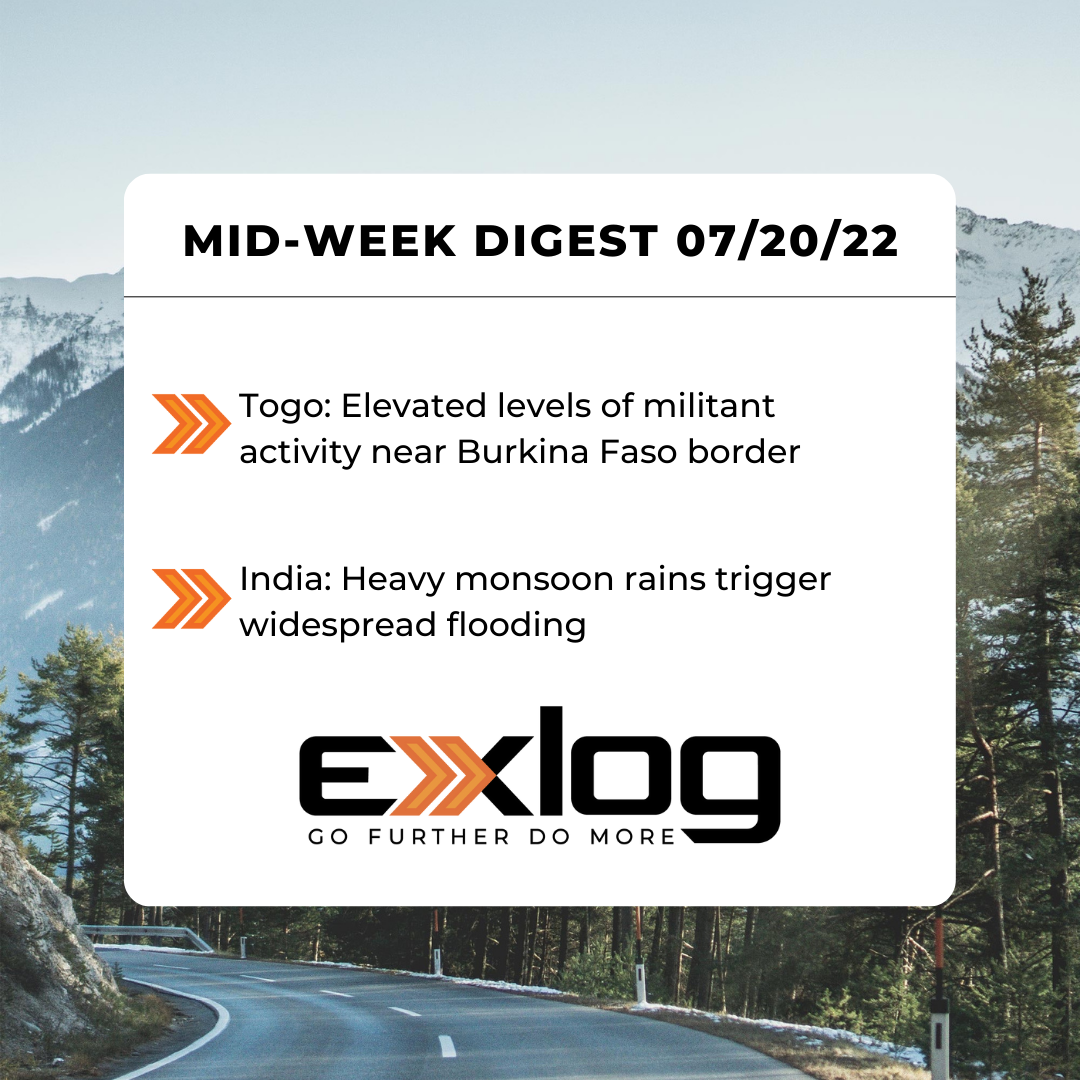Escalating Jihadist Violence in Togo and Devastating Flooding and Landslides in India
Togo: Escalated Levels of Militant Activity near Burkina Faso Border
The security environment in northern Togo has deteriorated following a string of militant attacks on civilian communities that killed more than 30 people over a three-day period last week. On July 13, unknown individuals kidnapped and executed a suspected government informant from the Bombengou village. The following evening, a group of gunmen attacked the villages of Kpemboli, Blamonga, Lalabiga, and Sougtangou and executed dozens of men. On July 15, the vehicle transporting the commissioner of Mandouri, Kpendjal Prefecture – who was on the way to investigate the recent incidents – struck an Improvised Explosive Device (IED), leading to the death of one person and injuries to the commissioner and his aids. While no group has claimed responsibility for the incidents, all the attacks occurred in the vicinity of the border with Burkina Faso – a known area of operations of Al-Qaeda linked Jama’a Nusrat ul-Islam wa al-Muslimin (JNIM). The group was behind a large-scale assault on the Kpinkankandi military base – located in the northern Kpendjal Prefecture – on May 11, killing 8 soldiers and injuring 13 others. The incident marked the first time the JNIM claimed responsibility for an attack inside Togo, although the organization is likely behind much of the jihadist violence in the country. While government-led counter-terrorism strategies have been effective in preventing the spillover of jihadist activity from Burkina Faso in recent years, militant attacks in northern Togo have increased in the past few months, with at least ten incidents reported since November 2021. In addition to Togo, neighboring Benin has also witnessed a spike in attacks in the vicinity of its border with Burkina Faso, indicating an expansion of jihadist groups across the region’s littoral states. The spike in violence fits a larger pattern of increasing militant activity in the Sahel and wider West Africa amid the French troop withdrawal from Mali – the stronghold of Al-Qaeda and Islamic State (IS) affiliates. Jihadist activity is likely to increase in the medium term as France and the EU continue to redefine their counter-terrorism strategies in the region, emphasizing the urgency for smaller coastal nations like Togo and Benin to increase internal security capabilities in order to prevent the expansion of extremist organizations on their territories.
India: Heavy Monsoon Rains Trigger Widespread Flooding
Heavy rainfall and severe flooding continue to batter states throughout western and northern India, resulting in hundreds of casualties and extensive infrastructure damage throughout the country. The states of Maharashtra, Karnataka, Gujarat, and Rajasthan have experienced the most severe impacts of the storms, which have ravaged India since the onset of its yearly monsoon season in June. In Maharashtra state alone, record-breaking rainfall and flooding have killed over 100 people and forced the evacuation of an additional 11,836 residents in recent weeks. Incessant rainfall triggered landslides in Maharashtra’s municipality of Vasai-Virar, where search and rescue workers were deployed to assist local residents trapped under debris. Landslides in the town of Khanapur, Karnataka State, led to the death of an additional 33 people. Flooding has also led to significant travel disruptions due to hazardous road conditions. In the state of Gujarat, floods killed 14 people, triggered the evacuation of more than 31,000 others and forced the government to close over 138 roads throughout the state. National Disaster Response Force teams have been deployed to assist with evacuations and infrastructure damage, with 13 being deployed to Maharashtra alone. Heavy rains and severe weather conditions are likely to persist in the near term as the monsoon season continues, threatening further casualties and damage to infrastructure and private property.


